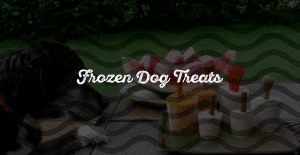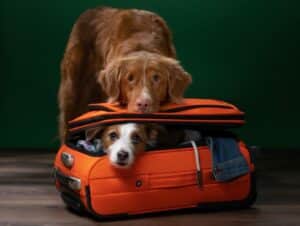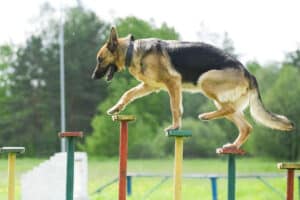I’m sure we have all experienced our dog’s flatulence at one point or another. Isn’t it the worst when you have friends and family over and your dog clears the room? It’s time we put an end to that! Here are some ways to get your dog’s flatulence under control.
The Proper Food
Do a little research and find out what some of the best foods are for your dog. Your dog’s diet should include dog food specifically designed with his age, breed and lifestyle in mind.
It should be easily digestible and nutritionally sound and should not include ingredients like ash, low-quality proteins (such as “by product”) or wheat, corn or potato products (anything with the word “meal” in it) which work as large amounts of carbohydrates do for humans — they fill you up with empty calories and don’t provide much nutritional benefit or energy.
A real meat should be listed at the top of the ingredients list, making it one of the main ingredients in the food. Not only will following these guidelines make your pup less gassy, but they’ll give him a better overall health as well.
No Table Scraps
Your dog is likely going to beg when you’re cooking or eating a meal, but that doesn’t mean that you have to give in. You’re the pet parent here for a reason — you know better than Fido what’s good for him.
Dogs with high-fat diets tend to have more issues with flatulence than dogs who don’t. Adding spices to anyone’s diet can cause digestion issues. And beyond that, sudden changes in your pup’s diet are a big cause of gastric distress.
So when you feed your pup those scraps of meat you’re just adding to everyone’s eventual discomfort.
Watch The Snacks and Treats
It’s not too difficult to understand that what you put into your dog is what’s going to come out of your dog. And just like people, too many treats and snacks can wreak havoc on the digestive system.
Excess sugars, carbohydrates and fats in your dog’s diet can cause gas, as well as obesity, which in turn can make a dog more prone to be flatulence — it’s an endless circle. Also, watch that your pup doesn’t get too many rawhide snacks, as they can ingest air while chewing which can also lead to gas. Snacks and treats are, as always, best in moderation.
Slow Down Eating
If your dog eats too quickly, it can also ingest air which causes flatulence. Additionally, too much food hitting the digestive tract at one time can cause difficult digestion which also causes flatulence.
Many pets have an ingrained habit of eating too quickly, so if you notice that your dog’s food is disappearing almost as soon as it’s given to him, work on slowing him down. First, space feedings out throughout the day into two or three meals instead of just giving a single bowl of food and allowing the dog to self-feed. If that doesn’t help, try putting a smaller, over-turned bowl into your dog’s larger food bowl so that he has to eat around it and take smaller mouthfuls.
Another method is to place a ball into the dog’s dish so that he has to move it around in order to get to his food. However you do it, slowing down your dog’s eating can work wonders for flatulent dogs.Enter your text here…
Live Dairy-Free
Just like people, some dogs are have a natural lactase deficiency, which is a lack of the enzyme that breaks down lactose, causing lactose intolerance. If your dog is one of them, any type of dairy can cause some rather uncomfortable digestive issues for your pup, a symptom of which will be quite a bit of gas expulsion.
Dogs with GI disease also have a very difficult time with dairy. Dogs don’t need dairy in their diets, so don’t let the puppy eyes scam you into hours of regret later.
Know Your Dog’s Food Allergies and Intolerances
Another reason to stay away from table scraps with your pet is because he may have an allergy or intolerance to something you’re feeding him — and you won’t find out until the damage is already done. Allergies typically manifest as an itching, head shaking or swelling, but intolerances are all about digestive distress.
If your dog seems to have gas every time you give him a certain food, then it’s likely a good idea to stop giving it to him, no matter how much he begs — it’s for his own good!
Avoid Dietary Indiscretion
A “dietary indiscretion” refers to any time that your pup gets into, and making a meal of, something he usually doesn’t and really shouldn’t have. This includes eating garbage, food meant for other species of animals (cat, bird, etc.), feces, rotten or spoiled food, rodents or anything else that isn’t a part of his diet.
While it’s bound to happen occasionally, make sure that your other pets’ foods aren’t left out and the garbage can is secure. While your dog might be pretty enthusiastic during the initial episode, it’s going to mean a rough night ahead of them trying to digest their indiscretions — which means lots of flatulence.
Keep Away From Hard-To-Digest Foods
Beans, peas and soy products are filled with proteins that are very hard for your dog to digest and, therefore, cause quite a bit of gas. Even if you’re not feeding your dog beans and peas from your own dinner plate, check his dog food — the culprit may be in your ingredients panel.
Cut Down On Veggies
Veggies are filled with lots of fiber. That’s part of why humans are supposed to eat them. However, your dog’s diet is different and doesn’t call for all of that fiber, and you’ll find out why when he begins to expel excess gas.
Veggies are more like a treat for dogs — especially the more obviously smelly ones such as onion and asparagus, as well as cruciferous veggies like broccoli, cauliflower, cabbage and brussel sprouts. If he’s really got a love affair with a certain vegetable, give it to him in a tablespoon-sized serving and only on occasion.
Watch For Swallowing Of Air
If your dog is of the short-headed or stub-nosed variety, such as a boxer, bulldog, chow chow, staffy or pug, then he likely breathes more through his mouth than his nose. You may often notice that your dog snores and pants more than other dogs. These things are pretty normal for a snub-nose, but they can still lead to air-swallowing and then flatulence. T
his also goes for overweight or obese dogs, who sometimes have trouble breathing due to the extra weight on their bodies. There may not be anything that you can do to completely stop their flatulence in the long-term, but talk to your vet to make sure you know what to watch out for in these specific types of dogs.
Check For Parasites
There are several different types of internal parasites that can cause gas in your dogs including roundworm, heartworm and tapeworm. There will usually be other symptoms that come with parasites in addition to the gastric distress, so make sure you’re keeping up with your dog’s vaccinations and dewormers and if his symptoms go beyond simple gas, get him to the vet right away.
Activated Charcoal
Adding a bit of activated charcoal to your dog’s diet can help to detoxify (and therefore de-stink-ify) gases while they are still in your dog’s intestines. It can be purchased at most pet stores and will come with instructions on dosing.
However, it is best used for the occasional bout of digestive upset rather than a habitually stinky pup, as the charcoal also absorbs nutrients and cannot be administered for more than two or three days at a time.
Check Medications
There are many different types of medication that your dog might be on that can cause flatulence. Prescription or over-the-counter drugs that impact digestion and bowel function can lead to gas, as can antibiotics, antidepressants, blood pressure medication and narcotics.
Check your dog’s medications to see if they could be the culprit and talk to your vet to see if anything can be changed to help your pup with his gastric distress.
Visit Your Vet
As always, if your dog suddenly becomes chronically gassy and none of the above seem to be the culprit, nothing beats an examination by your dog’s veterinarian. Canine flatulence can also be a symptom of an underlying disease or health concern, and nobody will know better than your vet.
So In Conclusion
This can be a tricky situation to solve, but we have found these are the best methods to help with the smell of dog flatulence in your home. Knowing your dog is no longer a ticking time bomb should give you back some peace of mind! Just follow our tips and find which ones work best for your dog’s gas.











